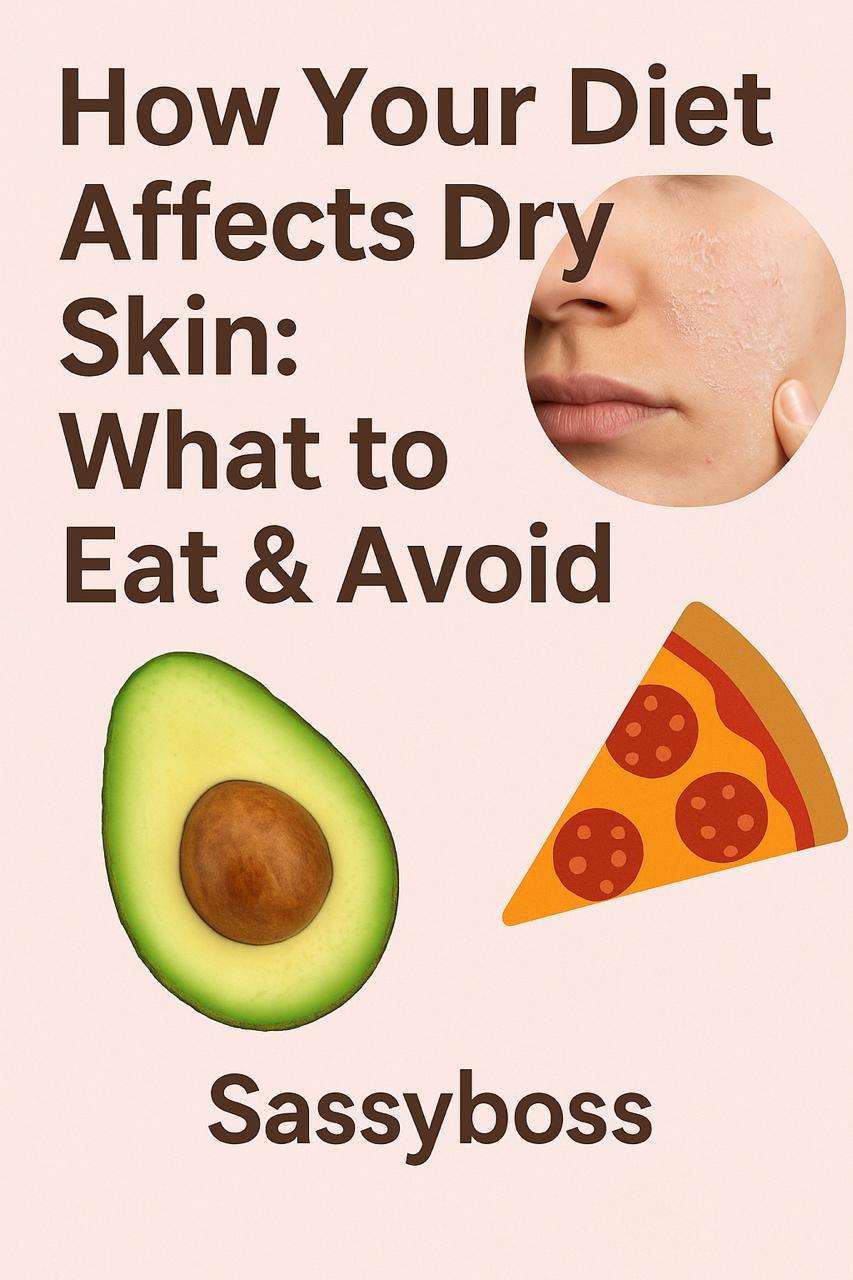How Your Diet Affects Dry Skin: What to Eat & Avoid
Dry skin isn’t just about what you put on your skin — it’s also about what you put in your body. While moisturizers and serums can help hydrate the surface, true skin health begins from within. Your diet plays a crucial role in maintaining your skin’s moisture barrier, elasticity, and overall glow. If you struggle with dryness, itchiness, or flakiness, it might be time to take a closer look at your plate.
In this article, we’ll explore how diet impacts dry skin, the best foods to include in your meals, and what to avoid for softer, more hydrated skin.
The Skin-Diet Connection
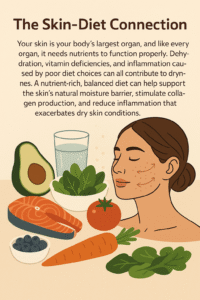
Your skin is your body’s largest organ, and like every organ, it needs nutrients to function properly. Dehydration, vitamin deficiencies, and inflammation caused by poor diet choices can all contribute to dryness. A nutrient-rich, balanced diet can help support the skin’s natural moisture barrier, stimulate collagen production, and reduce inflammation that exacerbates dry skin conditions.
Foods That Help Hydrate and Nourish Dry Skin
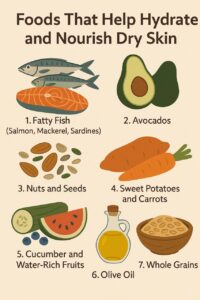
1. Fatty Fish (Salmon, Mackerel, Sardines)
Fatty fish are rich in omega-3 fatty acids, which are essential for skin hydration and reducing inflammation. Omega-3s help reinforce the skin’s lipid barrier — the protective shield that keeps moisture in and irritants out.
Tips: Aim for 2–3 servings of fatty fish per week or consider a high-quality fish oil supplement after consulting with a healthcare provider.
2. Avocados
Avocados are loaded with healthy fats, especially monounsaturated fats, which keep skin soft and supple. They’re also a great source of vitamin E — a powerful antioxidant that helps protect the skin from oxidative damage and dryness.
3. Nuts and Seeds
Almonds, walnuts, flaxseeds, and chia seeds provide a good mix of essential fatty acids and vitamin E. Flaxseeds and chia, in particular, are plant-based sources of omega-3s.
Bonus: These also support hormonal balance, which can impact skin dryness — especially in women.
4. Sweet Potatoes and Carrots
Both are rich in beta-carotene, which converts to vitamin A in the body — a crucial nutrient for skin cell turnover and repair. A vitamin A deficiency is often linked to dry, flaky skin.
5. Cucumber and Water-Rich Fruits
Hydration from within is key. Fruits and veggies with high water content like cucumbers, oranges, strawberries, and watermelon help keep your skin plump and hydrated.
6. Olive Oil
A staple of the Mediterranean diet, olive oil is packed with monounsaturated fats and polyphenols — both great for moisturizing the skin and fighting inflammation.
7. Whole Grains
Unlike refined carbs, whole grains contain zinc and B vitamins (especially B2 and B3), which play a role in maintaining skin integrity and moisture levels.
Foods That Can Make Dry Skin Worse
While some foods nourish your skin, others can dehydrate it or cause inflammation. Here are the ones to avoid or minimize:
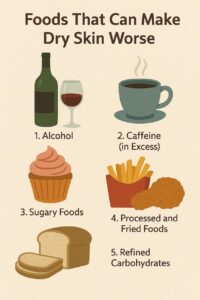
1. Alcohol
Alcohol is a known diuretic — it pulls water from your body and depletes nutrients like vitamin A and C, which are vital for skin health. Regular alcohol intake can lead to dehydrated, dull-looking skin.
2. Caffeine (in Excess)
While a moderate amount is generally fine, too much caffeine can have a diuretic effect similar to alcohol. If you consume a lot of coffee or soda, be sure to increase your water intake.
3. Sugary Foods
Sugar spikes insulin levels, which can trigger inflammation in the body and damage collagen and elastin — two proteins that keep your skin firm and hydrated. Excess sugar also contributes to glycation, a process that accelerates skin aging and dryness.
4. Processed and Fried Foods
These foods are often high in trans fats and low in nutritional value. They may disrupt your skin’s oil balance, leading to either excess oil production (followed by dryness) or further depletion of healthy fats your skin needs.
5. Refined Carbohydrates
White bread, pasta, and pastries have a high glycemic index and can increase insulin levels, promoting inflammation and damaging the skin barrier over time.
Hydration: Don’t Forget Water
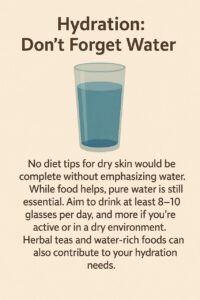
No diet tips for dry skin would be complete without emphasizing water. While food helps, pure water is still essential. Aim to drink at least 8–10 glasses per day, and more if you’re active or in a dry environment. Herbal teas and water-rich foods can also contribute to your hydration needs.
Final Thoughts
Your skin is a reflection of what’s happening inside your body. While skincare products play a supportive role, they can only go so far if your diet lacks essential nutrients. Eating a balanced, skin-friendly diet rich in healthy fats, antioxidants, and hydrating foods can help you fight dryness from the inside out.
So next time you reach for that tub of moisturizer, consider what’s on your fork, too — your skin just might thank you.
